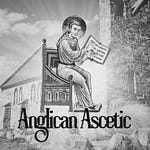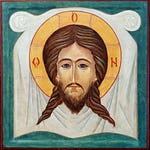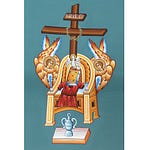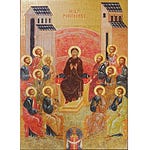Our gospel story gives us again the beautiful, simple, and touching story of the poor widow. And it is held up in our lectionary in our stewardship season, as it is reaching its conclusion. And that is so very fitting. Because Christian stewardship, for as much as I have said about it in my recent preaching, really is as simple as the poor widow. Just as she put in everything she had, her whole living, so are we to give our time, talent, and treasure for the glory of God and for the benefit of this parish church. Giving to the church her whole living, everything she had, means she gave her heart.
It means that her intentions in giving could not be but pure and godly. She was humble like the Tax Collector; she made no pretense of long prayers or showiness like the Pharisee. Her offering meant everything to her, and God beheld her offering and lifted it up to heaven, lifted it into glory for all to behold. I wish we knew the name of this poor widow. We are not told her name. But if we were told it, I am certain she would have the word “Saint” before her name and a feast day on the calendar. She surely was full of the Holy Spirit, and she shares that dual-quality of the Saints: that in all things she is to be admired, and that we should imitate her how we can. We admire her for her humility and her faith; let us imitate her in giving to the Church all we can: our heart.
In all things of the Christian life, the Saints are always to be remembered, celebrated, and venerated. I spoke these words about the Saints last Sunday: The Saints are examples to us of genuine stewardship. We can speak of the Saints as gardeners, in that they are dedicated to helping growth happen. Likewise the Saints certainly show humility before Almighty God, Who alone gives the increase. Saints are filled with the awe and fear of God, of the fact that all creative power comes from God, Who is the maker of all things, and through Whom all things are made. And the Saints know that in Christ’s garden, which is the Church, the Holy Spirit dwells, the Holy Spirit acts, the Holy Spirit leads us to Christ. The Saints themselves do not imitate the Pharisee, who does works to be rewarded by God, but rather they imitate the Tax Collector, the Publican, who is pure humility falls to his knees before God and asks simply for His mercy.
In the Apostles’ Creed, we say that we believe in the Communion of Saints. We say that because the Saints are the living foundation of the Church. They are the living foundation of the Church, the living foundation of the Body of Christ, because Christ lives in them. Certainly Christ was living in the poor widow. He lives in all the Saints. And Christ lives in the poor widow and all the Saints because the Saints are full of the Holy Spirit. We remember the Saints, we celebrate the Saints, we venerate the Saints, because in looking with the eyes of faith upon the Saints who are our fellow wayfarers, our friends, our contemporaries, our colleagues, the “Hall of Fame” Christians: in looking upon the Saints we see people whose ordinary lives were transformed by the Gospel of Jesus Christ into extraordinary lives of virtue, of faith, hope, and love, and divine wisdom. But it really is as simple as this: the Saints are full of the Holy Spirit. They were full of the Holy Spirit during their existence on earth, and they remain full of the Holy Spirit having run with patience the race set before them, and set before us, they have been taken up into heaven and received the crown of glory that fades not away, the same crown promised to all those who maintain a lively faith in Jesus Christ.
I say “lively faith”—not just “faith,” but faith that is “lively.” What do I mean by that? A lively faith is life in the Holy Spirit: constant wonder, constant awe, ever-sensing the divine presence in our heart and in the world, and a constant openness to divine disclosure: a constant openness to God’s revealing something of Himself through His Son Jesus Christ, Who is the Way, the Truth, and the Life.
If a parish takes seriously Christian stewardship, it becomes a garden with gardeners seeking the guidance of the Holy Spirit, who is the Lord and giver of Life: the giver of growth, and the only giver of growth, the only giver of increase. Gardens have a culture of biological and microbial activity; without that microbial culture, little to no plant growth happens. A parish is a garden that will grow if it has the right culture, as well: a culture of genuinely spiritual activity. A parish will grow if its culture is of the Holy Spirit and His Kingdom – indeed, a “Kingdom Culture,” within which our Saviour Jesus Christ lives and reigns as the King of kings and Lord of lords, the Lamb of God around Whom worship all the Angels and all the Saints, through Whom all things are made, and Who lives and reigns with the Father and the same Holy Spirit, ever one God, world without end. Amen.











Share this post